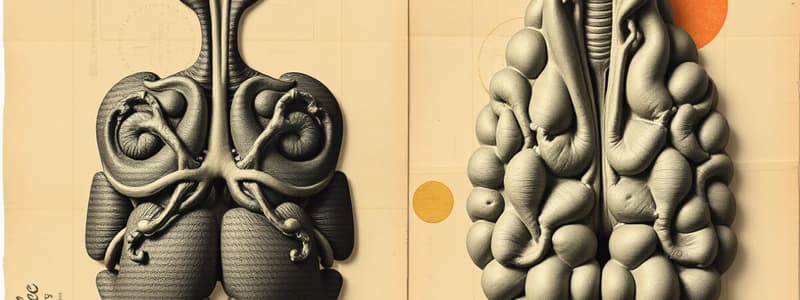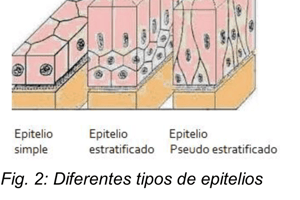Podcast
Questions and Answers
How are glands classified?
How are glands classified?
by mechanism of secretion
What are the types of glands?
What are the types of glands?
- Endocrine
- Exocrine
- Serous glands
- Mixed glands
- All of the above (correct)
What do serous glands produce?
What do serous glands produce?
non-viscous watery fluid
What are examples of serous glands?
What are examples of serous glands?
What do mucous glands secrete?
What do mucous glands secrete?
What are examples of mucous glands?
What are examples of mucous glands?
What are mixed glands?
What are mixed glands?
What is an example of mixed glands?
What is an example of mixed glands?
What are endocrine glands?
What are endocrine glands?
What are examples of endocrine glands?
What are examples of endocrine glands?
What are exocrine glands?
What are exocrine glands?
What are examples of exocrine glands?
What are examples of exocrine glands?
What are the types of exocrine glands?
What are the types of exocrine glands?
What is a unicellular exocrine gland?
What is a unicellular exocrine gland?
What is an example of a unicellular exocrine gland?
What is an example of a unicellular exocrine gland?
What are merocrine glands?
What are merocrine glands?
What is the purpose of merocrine glands?
What is the purpose of merocrine glands?
What are examples of merocrine glands?
What are examples of merocrine glands?
What are apocrine glands?
What are apocrine glands?
What is the purpose of apocrine glands?
What is the purpose of apocrine glands?
What are examples of apocrine glands?
What are examples of apocrine glands?
What are holocrine glands?
What are holocrine glands?
What is the purpose of holocrine glands?
What is the purpose of holocrine glands?
What is an example of a holocrine gland?
What is an example of a holocrine gland?
Flashcards are hidden until you start studying
Study Notes
Classification of Glands
- Glands are classified based on their mechanism of secretion.
Types of Glands
- Types include serous glands, mixed glands, mucous glands, endocrine glands, exocrine glands, merocrine (eccrine) glands, apocrine glands, and holocrine glands.
Serous Glands
- Produce non-viscous, watery fluids.
- Functions include carrying wastes to the skin surface, providing milk for nursing, and delivering digestive enzymes from the pancreas to the small intestine.
- Example: parotid salivary gland; also produces sweat, tears, and digestive juices.
Mucous Glands
- Secrete mucin that forms mucus when mixed with water.
- Located in the digestive system and sublingual salivary glands.
- Found on the surface of the tongue and roof of the mouth.
Mixed Glands
- Contain both mucus and serous cells; produce a mixture of secretions.
- Example: submandibular salivary glands.
Endocrine Glands
- Ductless glands that release secretions directly into the bloodstream.
- Examples include the pancreas, pituitary gland, and thyroid.
Exocrine Glands
- Typically have ducts and are formed from epithelial tissues.
- Secrete materials onto free epithelial surfaces.
- Examples include glands in the digestive tract, eyes, mammary glands, and sweat glands.
Types of Exocrine Glands
- Categorized into unicellular and multicellular types.
- Multicellular exocrine glands include merocrine, apocrine, and holocrine glands.
Unicellular Exocrine Glands
- Composed of a single cell; principal function is to secrete mucin.
- Lack ducts.
- Example: Goblet cells located in respiratory and digestive systems.
Merocrine Glands
- Also known as eccrine glands; located in the dermal layer.
- Secretion leaves the cell intact, comprising mucin or watery perspiration.
- Purpose: regulates body temperature, eliminates excess water and electrolytes, and prevents microbial growth.
- Examples include lacrimal glands, salivary glands, exocrine glands of the pancreas, and gastric glands.
Apocrine Glands
- Found in the dermal layer and are also sudoriferous glands.
- Secretion involves pinching off the top part of the cell, resulting in a viscous, milky substance rich in proteins and lipids.
- Activated during puberty and take part in secretion into hair follicles.
- Examples: mammary glands and sweat glands in axillary and pubic regions.
Holocrine Glands
- Also known as sebaceous or oil glands; secrete by rupturing, whereby cells die and become the secretion.
- Purpose: secretes sebum, which keeps hair healthy and prevents brittleness.
- Activity increases during puberty.
- Example: glands located in skin hair follicles.
Studying That Suits You
Use AI to generate personalized quizzes and flashcards to suit your learning preferences.




